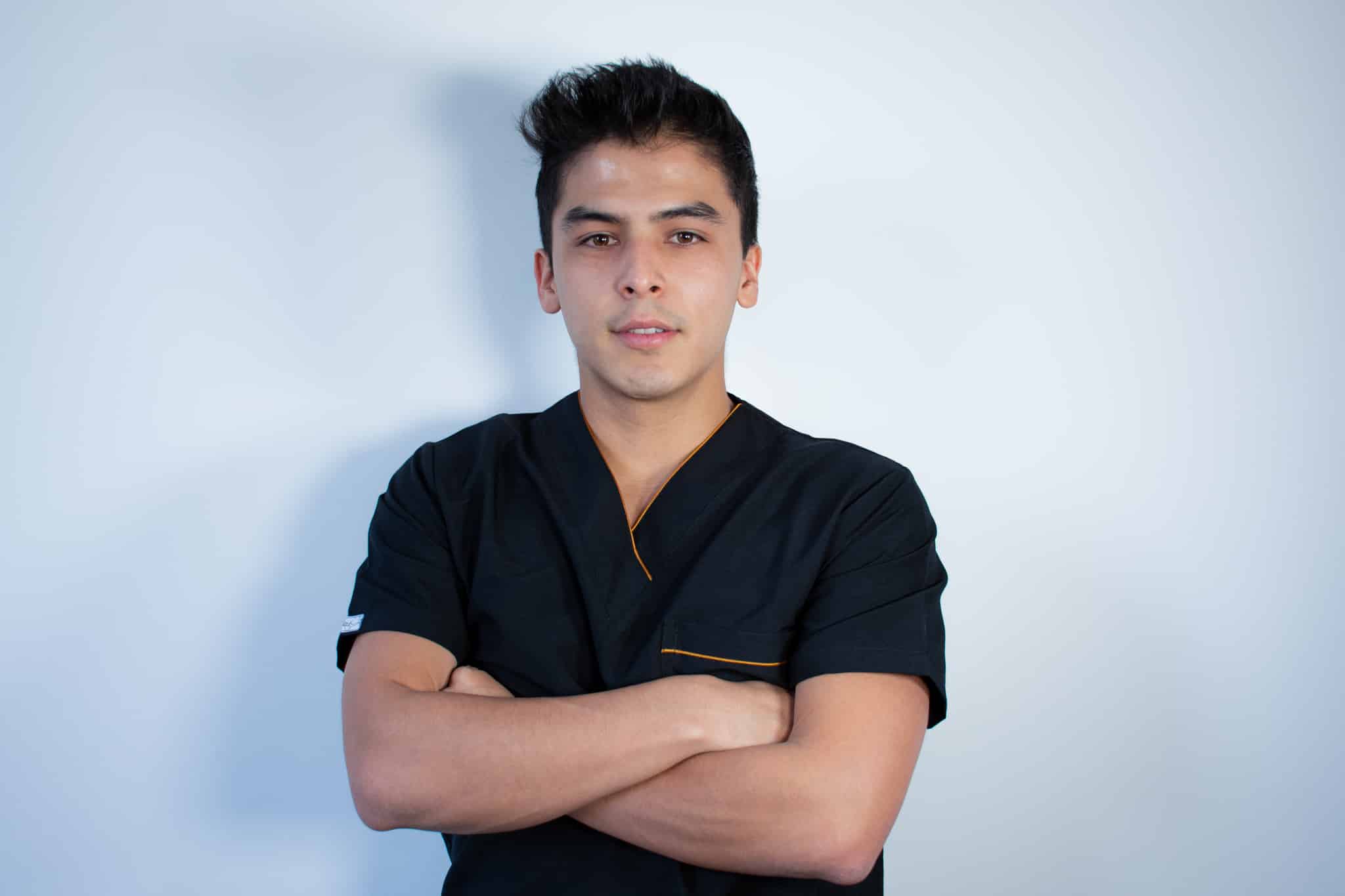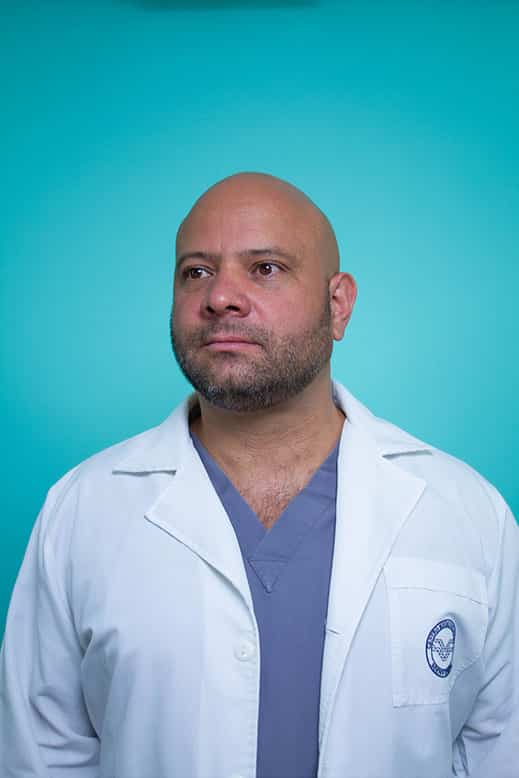Dental implants offer a permanent solution to the problems of missing teeth and are currently one of the treatments with the highest success rate.
The guarantees offered by this surgical intervention are the result of the great advances in the technique and technology used.
Thus, in our clinic we have advanced equipment, such as computer-guided surgery or a 3D intraoral scanner to obtain a better diagnosis.
Despite this, as with any medical intervention, the placement of implants is not free of risks, one of them being the development of peri-implantitis.
What is peri-implantitis?
Peri-implantitis is an oral pathology that can appear after the placement of one or more dental implants.
It occurs due to the accumulation of bacterial plaque in the tissues surrounding the implant.
Its main consequence is inflammation of the mucosa and loss of bone surrounding the titanium screw, so it is important to address it in time.
Otherwise, treatment failure may occur and the implant may need to be replaced.
Peri-implantitis is included in the so-called peri-implant diseases, this being the most aggressive.
Its initial version, and therefore more moderate, is mucositis.
We could say that this incipient phase is equivalent to gingivitis of the gums, while peri-implantitis has a process similar to that of periodontitis or pyorrhea.
Thus, mucositis damages the soft tissues of the mouth, while its more advanced stage affects the bone that supports and holds the dental implant.
Hence the importance of detecting this disease as soon as possible, since the advance of peri-implantitis leads, in the most serious cases, to the fall of the screw and the dental crown.
Peri-implant diseases
Enlarge image
PERI-IMPLANTITIS
Main symptoms of peri-implantitis
The main signs that we are developing a peri-implantitis problem are similar to those of mucositis, but aggravated.
Thus, the areas affected by the pathology present inflammation, bleeding and suppuration.
Unlike mucositis, in this stage gum recession and bone loss begin.
Peri-implantitis is related to the appearance of bacterial plaque around an implant due to incorrect oral hygiene.
What are the chances of developing it?
First of all, we want to clarify that not all patients are at risk of developing peri-implantitis, far from it.
However, it is a disease with a significant prevalence if we analyze the data published by the Spanish Society of Periodontology and Osseointegration (SEPA).
According to this entity, in studies published in recent years, a prevalence of peri-implantitis has been observed in 28-56% of patients and 17-43% of implants.
Furthermore, in 2012 it was concluded that in a period of 5-10 years after surgery, 20% of patients could develop peri-implantitis.
It seems an alarming figure, but it is necessary to emphasize that it is possible to avoid this disease in many cases.
To do so, it is crucial to know the causes that provoke it and the precautions to be taken before, during and after the intervention.
Risk factors
Since the accumulation of bacteria and oral biofilm are the first cause of peri-implantitis, oral hygiene plays an essential role.
Therefore, the first risk factor for developing this disease is not having adequate daily cleaning routines.
The implant works exactly the same as a natural tooth, so the same or even more attention must be paid to its hygiene.
Similarly, following the above explanation, mucositis precedes peri-implantitis.
Therefore, people diagnosed with the first pathology are more likely to have complications related to the more advanced stage.
This is especially the case if the patient does not undergo regular maintenance under the supervision of professional dentists.
A report published by SEPA in 2019 emphasizes that “the progression of peri-implantitis is faster than that observed in periodontitis and occurs in a non-linear and accelerated pattern.”
In addition, this society asserts that there is also “strong evidence of an increased risk of peri-implantitis in patients with a history of severe periodontitis.”
In case of people with previous periodontal disease, it is essential to have a dental check-up every few months.
Dental peri-implantitis
Enlarge image
TREATMENT OF PERI-IMPLANTITIS
Smoking: does it cause peri-implantitis?
Smoking has almost always been a warning sign regarding oral health, and rightly so.
However, following the information contained in the SEPA report, “the data identifying smoking as a potential risk indicator for peri-implantitis are not conclusive.”
But this does not mean that it does not affect in some way the correct development of an implant surgery, especially during the postoperative period.
People who smoke are more likely to suffer a rejection, that is, an incorrect healing of the implant.
Therefore, eradicating (or at least reducing) the consumption of cigarettes during 8 weeks before and after the intervention, minimizes to a great extent the problems of the implants.
Avoid risk factors
Many of the causes of peri-implantitis are easily avoidable by changing our daily hygiene routines.
How to avoid peri-implantitis
To avoid the accumulation of bacterial plaque that ends up causing peri-implantitis, it is essential to meet two conditions:
Firstly, implant placement must be carried out by a trained and experienced implantologist.
It is not the same to put yourself in the hands of a generic dentist as in those of a surgeon who has an extensive dental career behind him.
This is the case of the doctors at DrAW Dental Clinic, who practice their specialty exclusively and have developed great skill when it comes to performing this type of surgery.
Secondly, it is crucial that the person follows the instructions received by the professional.
These instructions may vary according to each case, so they must be personalized and previously studied by the specialist.
However, there are a series of general guidelines concerning various aspects that are applicable to most patients.
By following them, there is a high probability of avoiding peri-implant diseases.
MAKE AN APPOINTMENT WITH OUR IMPLANTOLOGISTS
Oral hygiene
As we have previously indicated, it is essential to take care of the hygiene of dental implants.
In order to maintain adequate daily routines, it is very positive to complement brushing with other cleaning aids.
The oral irrigator, on the one hand, works with an adjustable pressure jet of water that eliminates food debris in the nooks and crannies of the mouth.
On the other hand, interproximal brushes clean the interdental area -between the tooth and the tooth- so that food debris does not accumulate.
Finally, it is advisable to rinse your mouth with mouthwash at least once a day.
Tipodonto
Enlarge image
DENTAL IMPLANT
Professional dental cleaning
Even using the elements we have just mentioned, hygiene at home is not enough to ensure optimal oral health.
It is therefore important to visit a clinic to have a team of dental hygienists carry out a prophylaxis.
It is the implantologist who must determine the periodicity of these consultations, which will vary according to each patient.
Generally, a person who has not had periodontal complications will visit every 8 to 10 months.
However, patients who have experienced previous peri-implant or periodontal disease should normally visit every 4 to 6 months.
Periodic check-ups
Check-ups are crucial so that the implantologist can keep track of the evolution of the healing and the dental implant.
On occasions, some people do not have the necessary constancy to ensure that their follow-up is correct, which is an unnecessary risk.
These consultations allow the professional to evaluate the state of the implants, to assess whether the osseointegration process is normal and to warn of possible future risks.
Therefore, ignoring the scheduled check-ups means that dangers are overlooked and complications are detected in advanced stages.
As in any other branch of medicine, in dentistry, a late diagnosis worsens the prognosis.
Now that you know the causes that we can rule out, we will have much less reason not to worry about peri-implant diseases.



